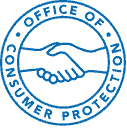Common Online Scams
Lotteries and Sweepstakes Scams
Bait: You get an email that claims you’ve won a foreign lottery or an online sweepstakes and to get your winnings your must send a check or a wire transfer to cover taxes, fees, shipping costs, or insurance.
Catch: Any letter that asks you pay for taxes, fees, shipping, or insurance to claim your prize is a scam.
What you can do: Don’t accept!
Investment Scams
Bait: Investments that promise high rates of return with little or no risk
Catch: Many are good for the promoters but not for the investors. These scam artists operate a particular scam for a short time, close down before they can be detected, and then spend the money they earned.
What You Can Do: Carefully read the offer and evaluate the legitimacy. Don’t let the promoter pressure you into investing if you are unsure.
Tech Support Scams
Scammers set up fake websites, offer free “security” scans, send alarming messages stating that your computer is infected, then try to sell you software to fix the bug. At best this software is worthless or available for free elsewhere, but at worst, it can be malware (designed to allow scam artists access to your computer and personal information)
Things to look out for:
- If they ask you to give them remote access to your computer
- If they try to enroll you in a worthless program
- If they ask for credit card information (either over the phone or through a website they direct you to)
- If you get a call from someone who claims to be a tech support person – hang up and call the company yourself If you’ve responded to a scam: Get rid of malware. Change passwords. If you paid by credit card, ask your credit card provider to reverse the charges.
If you’ve responded to a scam: Get rid of malware. Change passwords. If you paid by credit card, ask your credit card provider to reverse the charges.
Phishing :
Phishing is a very popular online scam. Our section on this type of scam can be found at http://www.montgomerycountymd.gov/ocp/a_z/phishing/index.html.
Other Scams
You can check out other scams at http://www.onguardonline.gov/articles/0002-common-online-scams.
